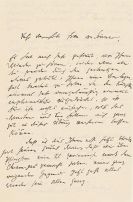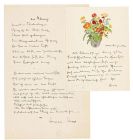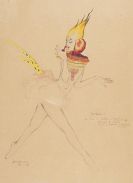
Oscar Wilde
Dublin
1854 -
Paris
1900
Oscar Fingal O' Flahertie Wills Wilde, or more succinctly Oscar Wilde, was born on October 16, 1854 in Dublin. He had his first encounters with literature and writing early on. His father, a leading eye and ear surgeon, published books on archeology, folklore, and the satirist Jonathon Swift. His mother was a translator and was considered a revolutionary lyricist under the pseudonym "Speranza."
From 1864 until 1871, Wilde attended school and thereafter studied classics at Trinity College, Dublin. In 1874, he went to Magdalen College, Oxford for another four years.
Already during his studies, Wilde turned his attentions to writing and oriented himself according to the aesthetics of Walter Horatio Pater and John Ruskin.
In 1878, he first received literary recognition for the poem "Ravenna" and therewith the Newdigate Prize. Wilde took to London after finishing his studies. Oscar Wilde, who was admired as a writer within his prudish Victorian society, was also considered a dandy and scandal author. He married Constance Lloyd in 1884.
During the following years in London, Wilde published many works, including a collection of fairy tales, "The Happy Prince and Other Tales" in 1888 and "The Picture of Dorian Gray" in 1891. In addition, he lectured in the United States and Canada, worked for the "Pall Mall" Gazette from 1887 to 1889, and subsequently edited the magazine "Woman's World." Wilde wrote a new book nearly every year until 1895, primarily satirical social comedies. The most well known are "Lady Windermere's Fan" (1892), "A Woman of No Importance" (1893), "An Ideal Husband" (1895) and "The Importance of Being Earnest" (1895); this last piece satirizes the upper classes and is considered his best work.
Only his tragedy "Salome" found no publisher due to being censured, in part for the revealing Jugendstil illustrations by Aubrey Beardsley. Only after the German translation was set to music by Richard Strauss, the opera "Salome" found worldwide appreciation.
1895 was a year of upheaval for Wilde. He was sentenced to two years hard labor because of his homosexuality; his wife left the country, taking the children to live near Heidelberg, Germany; there she went by the name Constance Holland.
In the Reading penitentiary, Wilde wrote a text in the form of a letter on the inhuman conditions (child prisoners and child labor) inside the prison. In 1905, this work was published under the title "De profundis," with possibly objectionable passages having been cut out. It was published completely in 1949.
His health decimated, Wilde was released in 1897 and went to Paris. Under the name Sebastian Melmoth, he lived the last three years of his life alone and penniless. Oscar Wilde died on November 30, 1900 in the Hotel d'Alsace in Paris.
His last words are said to be, "My wallpaper and I are fighting a duel to the death. One or other of us has got to go."
Would you like to sell a work by Oscar Wilde?
Infos for seller






